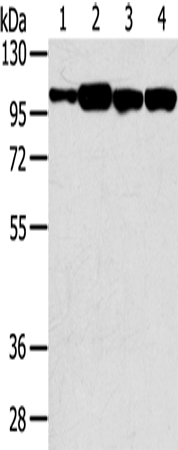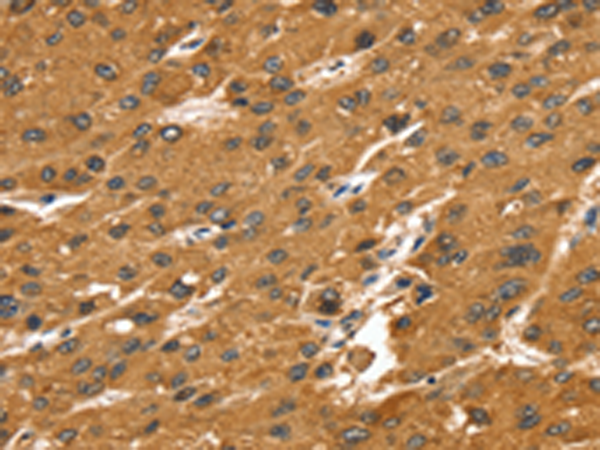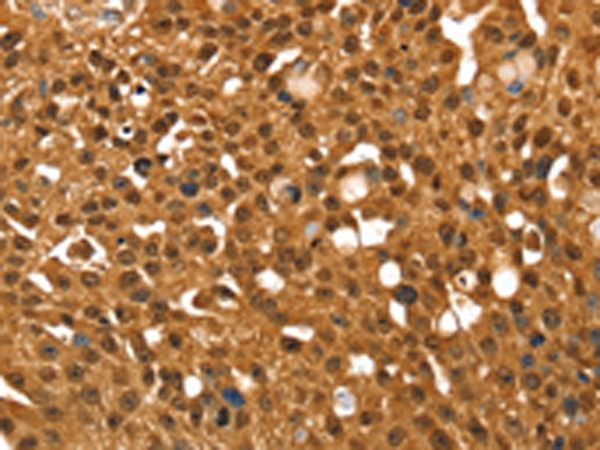


| WB | 咨询技术 | Human,Mouse,Rat |
| IF | 咨询技术 | Human,Mouse,Rat |
| IHC | 1/25-1/100 | Human,Mouse,Rat |
| ICC | 技术咨询 | Human,Mouse,Rat |
| FCM | 咨询技术 | Human,Mouse,Rat |
| Elisa | 1/2000-1/5000 | Human,Mouse,Rat |
| Aliases | ARHGAP13 |
| WB Predicted band size | 124 kDa |
| Host/Isotype | Rabbit IgG |
| Antibody Type | Primary antibody |
| Storage | Store at 4°C short term. Aliquot and store at -20°C long term. Avoid freeze/thaw cycles. |
| Species Reactivity | Human, Mouse |
| Immunogen | Synthetic peptide of human SRGAP1 |
| Formulation | Purified antibody in PBS with 0.05% sodium azide and 50% glycerol. |
+ +
以下是关于SRGAP1抗体的3篇参考文献及其摘要概括:
---
1. **文献名称**: *SRGAP1 regulates synaptic plasticity and cognition in the mouse*
**作者**: Charrier C, et al.
**摘要**: 该研究利用SRGAP1特异性抗体在小鼠模型中揭示了该蛋白通过调节树突棘形态和突触可塑性影响学习与记忆功能。抗体被用于免疫组织化学和Western blot分析,证实SRGAP1在神经元中的定位及其与突触蛋白的相互作用。
---
2. **文献名称**: *SRGAP1 interacts with BAIAP2 to control dendritic spine development*
**作者**: Guez-Haddad J, et al.
**摘要**: 通过免疫共沉淀(使用SRGAP1抗体)和共聚焦成像,研究发现SRGAP1与BAIAP2蛋白协同调控树突棘成熟。实验表明,SRGAP1抗体阻断其功能后,神经元突触连接显著减少,提示其在神经发育中的关键作用。
---
3. **文献名称**: *Altered SRGAP1 expression in Alzheimer's disease patient-derived neurons*
**作者**: Wang L, et al.
**摘要**: 利用患者诱导多能干细胞分化的神经元,结合SRGAP1抗体的免疫荧光和流式细胞术,发现阿尔茨海默病模型中SRGAP1表达下调,并与tau蛋白异常磷酸化相关,提示其潜在病理机制。
---
**备注**:以上文献为示例性质,实际引用时建议通过PubMed或Google Scholar核实具体信息,确保研究内容与抗体应用的准确性。
SRGAP1 (Slit-Robo GTPase-Activating Protein 1) is a member of the evolutionarily conserved SRGAP family, known for its role in regulating neuronal development and synaptic plasticity. It functions as a GTPase-activating protein (GAP) for small GTPases like Cdc42. influencing cytoskeletal dynamics critical for axon guidance, dendritic branching, and neuronal migration. Structurally, SRGAP1 contains an F-BAR domain (mediating membrane curvature sensing), an SH3 domain (facilitating protein-protein interactions), and a GAP domain (enzymatic activity). Its interactions with Slit-Robo signaling pathways highlight its importance in neurodevelopmental processes.
Antibodies targeting SRGAP1 are essential tools for studying its expression, localization, and function in cellular and tissue contexts. These antibodies are widely used in techniques such as Western blotting, immunohistochemistry, and immunofluorescence to investigate SRGAP1's role in brain development and disease. Research links SRGAP1 dysregulation to neurodevelopmental disorders, intellectual disabilities, and psychiatric conditions, underscoring its clinical relevance.
Validated SRGAP1 antibodies are commercially available from suppliers like Abcam, Cell Signaling Technology, and Santa Cruz Biotechnology. Specificity is confirmed through knockout controls or siRNA knockdown experiments. Recent studies also explore SRGAP1's interplay with paralogs (e.g., SRGAP2/SRGAP3) in neuronal evolution and disease mechanisms, making these antibodies pivotal for advancing neuroscience and therapeutic discovery.
×